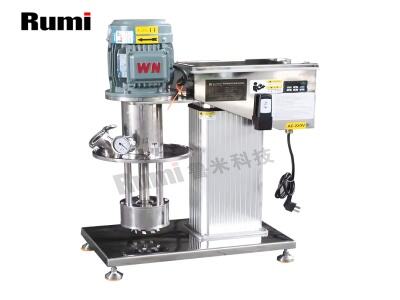Manufacturing industries depend on special equipment which is used to convert raw material into high quality finish products. The key role in this refining is played by industrial mills as they allow a high degree of particle size reduction and material homogenization. Rumi offers superior milling options that enable manufacturers to record high product quality and operation efficiency.
1. The Fundamental Role of Milling
Industrial mills are mechanical force driven mechanisms that are used to separate raw material into desired particle sizes. The process improves the material characteristics of solubility, reactivity, and texture uniformity. Mills provide uniformity and consistency in the coarse grinding to ultra-fine dispersion necessary to achieve raw materials to precise specifications that down-stream production requires.
2. Versatility Across Industries
The modern state of milling equipment is used by various manufacturing industries
Coatings and Paints: Optimised pigment dispersion to obtain colour consistency
Chemicals: The particle size controllability enables better reactivity of the compound
Pharmaceuticals: Making sure that the drug formatting relies on accurate particle sizing
3. Precision Engineering for Consistent Results
Modern mills provide the grinding media that can be adjusted, temperature regulation systems, and variable speeds drives to support processing conditions. Real-time digital monitoring systems monitor particle size distribution, and any change can be corrected by the operator immediately to achieve batch-to-batch reproducibility.
4. Enhancing Material Properties
In addition to particle size reduction, milling enhances the vital properties of the material:
Greater surface area to promote higher dissolution rates
Better mixing of blends in multi components systems
Strengthened product stability and shelf life
Better appearance and performance of the end products
5. Operational Efficiency and Sustainability
Elements like energy efficiency and minimised waste production now become the focus point when it comes to contemporary mill designs. In closed-system designs, material loss can be ruled out and environmental effect put at a minimum. This can also be achieved by answers such as; bulk change bits and easy cleaning services which minimize the time between production of different kinds of products.
6. Maintenance and Long-Term Reliability
Rumi milling equipment has sturdy components constructed with wear-resistant materials that are able to handle non-stop operation. Maintenance designs are simplified to allow easy access to important equipment, and automated lubricated systems increase equipment life in harsh manufacturing schedules.
Manufacturers still cannot do without industrial mills when it comes to optimizing raw materials utilization and the quality of their products. Technology moves along and these systems are becoming more efficient and have smarter controls.
 EN
EN
 AR
AR
 BG
BG
 HR
HR
 CS
CS
 DA
DA
 NL
NL
 FI
FI
 FR
FR
 DE
DE
 EL
EL
 IT
IT
 JA
JA
 KO
KO
 NO
NO
 PL
PL
 PT
PT
 RO
RO
 RU
RU
 ES
ES
 SV
SV
 TL
TL
 ID
ID
 LT
LT
 SR
SR
 SK
SK
 SL
SL
 VI
VI
 HU
HU
 TH
TH
 TR
TR
 FA
FA
 MS
MS
 BE
BE
 IS
IS
 AZ
AZ
 BN
BN
 EO
EO
 LA
LA
 MN
MN



